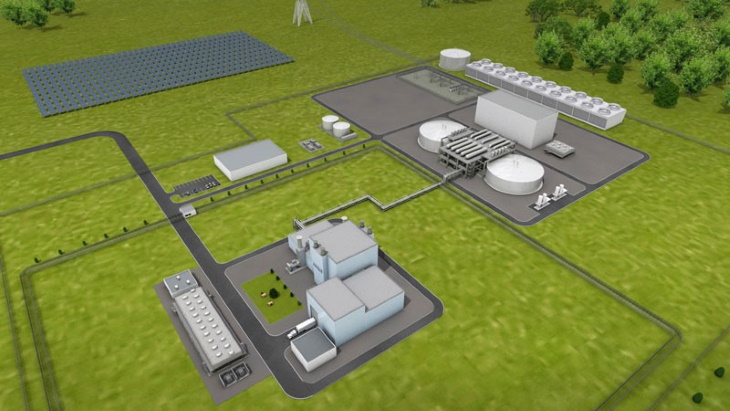Plans to construct a Natrium reactor demonstration project at a retiring coal plant in the US state of Wyoming were announced on June 2 by TerraPower, PacifiCorp and Wyoming Governor Mark Gordon. The companies are evaluating several potential locations in the state for the plant, which will feature a 345 MWe sodium-cooled fast reactor combined with a molten salt energy storage system that can boost the system's output to 500 MWe for more than five-and-a-half hours when needed. They expect to announce the selected site by the end of 2021.

How a Natrium plant may appear (Image: TerraPower)
TerraPower - a company largely funded by Microsoft founder Bill Gates - and GE Hitachi Nuclear Energy (GEH) announced the launch of the Natrium concept in September 2020. The partners hope to commercialise the technology by the end of this decade.
TerraPower says Natrium's novel architecture simplifies previous reactor types. Non-nuclear mechanical, electrical and other equipment will be housed in separate structures, reducing complexity and cost. The design is intended to permit significant cost savings by allowing major portions of the plant to be built to industrial standards. Improvements use fewer equipment interfaces and reduce the amount of nuclear-grade concrete by 80% compared to large reactors. Natrium reactors are designed to provide firm, flexible power that seamlessly integrates into power grids with high penetrations of renewables.
The demonstration project in Wyoming will be a fully functioning power plant and is intended to validate the design, construction and operational features of the Natrium technology, TerraPower said. It said the next steps include further project evaluation, education and outreach, and state and federal regulatory approvals prior to acquisition of a Natrium facility.
Along with Berkshire Hathaway Energy subsidiary PacifiCorp and GEH, members of the demonstration project team include engineering and construction partner Bechtel, Energy Northwest, Duke Energy and nearly a dozen additional companies, universities and national laboratory partners.
"Together with PacifiCorp, we're creating the energy grid of the future where advanced nuclear technologies provide good-paying jobs and clean energy for years to come," said TerraPower president and CEO Chris Levesque. "The Natrium technology was designed to solve a challenge utilities face as they work to enhance grid reliability and stability while meeting decarbonisation and emissions-reduction goals."
Gary Hoogeveen, president and CEO of Rocky Mountain Power, a division of PacifiCorp, added: "Siting a Natrium advanced reactor at a retiring Wyoming coal plant could ensure that a formerly productive coal generation site continues to produce reliable power for our customers. We are currently conducting joint due diligence to ensure this opportunity is cost-effective for our customers and a great fit for Wyoming and the communities we serve."
Wyoming Governor Mark Gordon said the state's workforce is looking forward to the jobs this project will provide.
Scott Melbye, president of Uranium Producers of America (UPA) and executive vice president of Uranium Energy Corp, also welcomed the announcement. "The UPA's member companies have the production capability to support the fuel needs of this programme and hopefully many new advanced and small modular reactors to follow. Wyoming uranium providing energy jobs and clean, reliable nuclear electricity here in Wyoming has a wonderful ring to it."
In October 2020, the US Department of Energy (DOE), through its Advanced Reactor Demonstration Program (ARDP), awarded TerraPower USD80 million in initial funding to demonstrate the Natrium technology. The ARDP programme aims to speed the demonstration of advanced reactors through cost-shared partnerships with US industry. TerraPower signed the cooperative agreement with DOE in May 2021. To date, Congress has appropriated USD160 million for the ARDP and DOE has committed additional funding in the coming years, subject to appropriations.
Researched and written by World Nuclear News